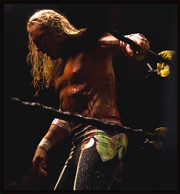 Darren Aronofsky is a filmmaker right on the border between avant-garde and well-recognized. It's a nice place to inhabit, as an artist... a space where you'll find most of the "hip" stuff in this day and age. There's some status associated with being edgy and non-formulaic, but your name is also easy to drop and sounds good in all the trendsetting circles. Having thus pigeonholed DA, I'd like to discuss his newest film, The Wrestler, which came to New York in December 08.
Darren Aronofsky is a filmmaker right on the border between avant-garde and well-recognized. It's a nice place to inhabit, as an artist... a space where you'll find most of the "hip" stuff in this day and age. There's some status associated with being edgy and non-formulaic, but your name is also easy to drop and sounds good in all the trendsetting circles. Having thus pigeonholed DA, I'd like to discuss his newest film, The Wrestler, which came to New York in December 08.The Wrestler is refreshing. Aronofsky has spent the last ten years making unhinged films about madness, addiction, and desperation. Whether in Pi's paranoid delusion, Requiem's claustrophobic dependency, or The Fountain's densely symbolic story of epic self-denial, we're always in a gratingly alien head-space in Aaronofsky's films. We're put through paces that are so intense, we can barely relate to them, and we're left with nothing to talk about at the end of the picture. The Wrestler contrasts starkly with these previous films. It's a sympathetic, restrained story with a lot of authentic pathos. For the first time, we have an Aronofsky film about character, rather than concept, and though it's less twisted, it may be a lot more interesting.
For a "hip" director (I'll put that in scare quotes to show that I actually really admire Aronofsky, and have no interest in trivializing his work), making a film about professional wrestling can be a touchy endeavor. When you're a serious director and you put your hands on something many people take very un-seriously, it can come across as satirical, or obnoxiously ironic. Aronofsky does an excellent job, though. He doesn't approach wrestling as a curiosity or a carnival side-show... he approaches it as a fan would approach it. It's obvious why people would want to cheer for Randy, not just because we feel his pain backstage, but also because we see his trials as an athlete, and the importance that pro wrestling has for him.
With my opinion well-established, I'll go ahead and offer one critical perspective on the film. Considered as a character tragedy, or as a realist narrative, it's truly an achievement. However, from a feminist perspective, The Wrestler may warrant some critique. After all, there are essentially three main characters -- Randy, Cassidy (his love interest), and Stephanie (his daughter) -- and two are female. Ultimately, it is these central characters who bring about Randy's downfall. They are no more flawed than he is, but they are the ones who complicate his real life to such a degree that he loses control over it.
In fact, Randy's downfall can be attributed to three characters, and each of these characters fills certain traditional/literary sexist roles. Cassidy, his love interest, is the ice queen, so committed to her own aspirations that she can't make room in her heart for Randy, and she has to turn him away when he tries to open up to her. Stephanie, his daughter, is the hysteric, the female character so overcome by emotion that she rages at the people who love her, and ultimately drives them away. The third instrumental female, who only has one scene, is the girl at the bar who asks Randy if he wants to "party," and ultimately prevents him from making it to dinner. She's the temptress... the opposite role from Cassidy, offering Randy something to undermine him when he's at his weakest.
Aronofsky's film wasn't about the perils of the female sex... it was about Randy trying to sort out a life of emotional neglect, and naturally, these emotional commitments are the ones that cross the gender gap. It's a film about a wrestler, and it's a moving portrayal. So take the above feminist perspective into consideration, but don't forget what a fantastic piece of cinema this was, all told. I hope Aronofsky, Rourke, and Marissa Tomei are all remembered for this film, which will be a unique badge of honor on their careers.

No comments:
Post a Comment